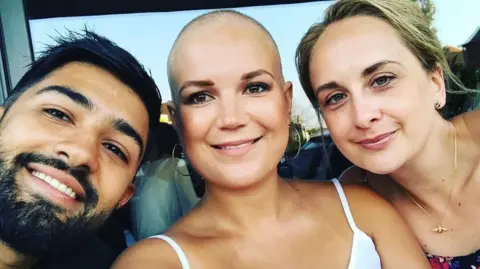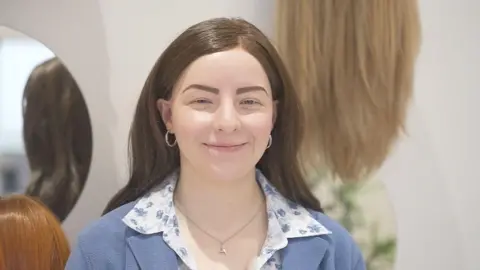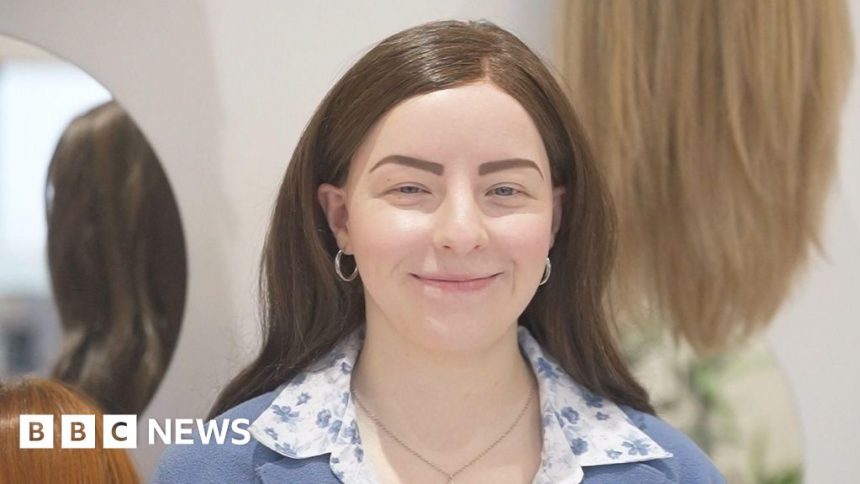Alopecia: New NHS drug ‘could make life so much easier’
 FAMILY HANDOUT
FAMILY HANDOUTEarlier this year a new drug to treat severe alopecia – an autoimmune condition that causes hair loss – was given the green light for NHS use. Some are keen to try it, others aren’t – and some even think it could potentially be life-changing.
Alicia Pylypczuk was a gregarious A&E doctor who took her own life after years of struggling with depression triggered by alopecia.
It’s now been four years since her death and Alicia’s stepfather Alan Green is sure she would have taken the new medication.
The 29-year-old from Manchester started suffering from episodes of hair loss as a teenager, when studying for her A-levels.
She was told by a dermatologist that little could be done to stop her alopecia, according to Alan, who believes the psychological effects caused a loss of identity.
 Family handout
Family handout“She was a very articulate, clever and dedicated doctor,” says Alan.
She loved spending time with friends and was musically talented, he adds, but the condition impacted the way she thought people saw her.
“Everyone told her without her wigs she was an extremely beautiful woman, but she didn’t see that. She just saw it as ugly and unattractive – all of that started to affect the rest of her life.”
In February this year, a new drug, ritlecitinib, was recommended on the NHS in England and Wales for the first time for patients aged 12 and over with severe alopecia.
Months later in April it was approved for NHS usage in Scotland and in Northern Ireland.
Alopecia is caused by the immune system mistakenly attacking hair follicles at the root of the hair, causing it to fall out.
The treatment decreases the activity of the parts of the immune system involved in that inflammatory response.
Evidence from clinical trials show nearly 25% of adults and adolescents taking the treatment, under the brand name Litfulo, saw significant hair regrowth which covered 80% or more of their scalp within 24 weeks.
If the treatment had been available before Alicia died, she would have grasped the opportunity “with both hands”, says Alan.
“It is very difficult to live in the mind of someone who has alopecia.
“I don’t think people are aware of the problems people with alopecia go through – and more people need to speak about it.”

Alopecia and Me
A new drug aimed at encouraging hair growth for people with alopecia has been approved for use on the NHS in the UK – but is the treatment worth it for everyone?
If you’re in the UK, watch on BBC iPlayer

Newcastle actor Sam McGregor recently moved to London with the ambition of launching his acting and writing career.
But soon after moving to the capital he rapidly lost his eyelashes and eyebrows. Clumps of his hair started to shed.
“I wasn’t ashamed,” Sam explains. “But when you notice how pale your scalp is, you go ‘woah’. There was that initial two-week period when I was not feeling great.
“When people associate you with no hair, they think it is something way more than it is.”
 Caden Elliott
Caden ElliottHe says bald men are expected to act in “certain parts” on TV, and he found himself asking: “What is my casting bracket now?”
But then he realised he “stood out more”, and it ultimately became a unique selling point.
“It became advantageous,” he says. “But I was still very uncertain as to how it was all going to play out.”
Inspired to inform people about what it’s like to have alopecia, Sam created and performed a play about the condition at the Edinburgh Fringe Festival last August.
His show Truly, Madly, Baldy tackled issues encountered by both men and women – as well as those coming to terms with sudden hair loss.
“I have had a mixture of bad times and frustrating times,” Sam explains.
He’s heard offensive things, “but because I was comfortable in my hair loss I took it onboard and thought: I can write this down and do something with this later”.
Sam says he doesn’t like “singing [his own] praises” about what alopecia has done for him and feels like he’s in a minority.
“Overall it got me work. My hair fell out and all of the work started to flood in. The play is about what can I give back, what can I do to make other people aware of it.”
Sam says he knows people who have taken ritlecitinib and who have seen hair regrowth.
“It is great that it is out there and people can have a go at it,” Sam explains. “But I personally won’t take it.
“I won’t ever say never, but I am happy with alopecia at the moment.”

Glasgow student Megan McGready has also learnt to embrace her condition and now supports other young people going through the same thing.
“Going into high school, losing my hair was terrifying,” Megan recalls.” I was off so many days. It was awful and I was getting bullied a lot.
“I was scared to touch my hair and I would be constantly going out in the bathrooms, seeing if I can fix it or seeing if it was noticeable.”
Without telling anyone, at the age of 13 years old, Megan took a pair of scissors and chopped and shaved the hair that she did have and for her it was a way of taking control of her situation.
“I felt more free,” she says. “I felt more in charge.”
Still, alopecia made her change her long-term life plans.
Megan wanted to go into sports coaching, but faced difficulties balancing sports with wearing wigs, which can lead to overheating, as well as painted-on eyebrows.
 Unknown
UnknownMegan has always kept up with alopecia treatment research, so was delighted to see ritlecitinib be accepted in April by the Scottish Medicines Consortium.
She is up for trying the new treatment.
“This new drug could potentially make my life so much easier,” she continues.
“Getting up in the mornings I don’t have to worry about my eyebrows, I can just go out and enjoy myself or worry about overheating with my wig.
“If I did get my hair back, I would appreciate it more. The new drug is definitely going to be life-changing for a lot of people.”
Though ritlecitinib has been approved for use by the NHS, few patients have been prescribed it.
One month’s worth of pills costs the health service just under £1,000, and regular blood work is required to monitor progress.
But Alicia’s stepfather sees it as a huge move in the right direction.
“It is a prospect,” Alan says. “We don’t know how effective it will be – will it be effective for everybody?” Alan asks.
“Time will tell. It is an opportunity for the alopecia community to have a bit of hope.”
If you’ve been affected by the issues in this story, help and support is available via the BBC Action Line







